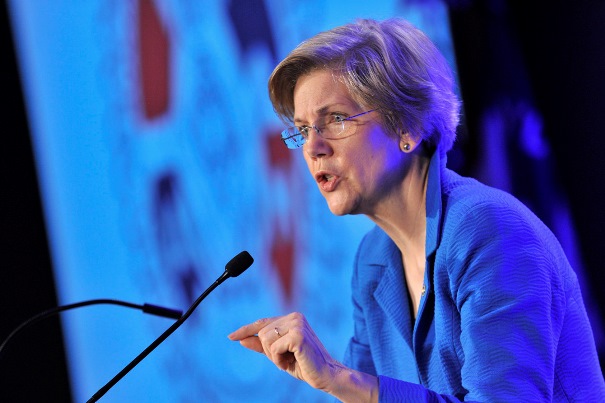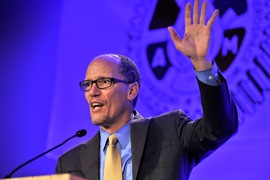 |
| U.S. Sen. Elizabeth Warren (D-MA), speaking at the 2014 IAM Legislative Conference in Washington, DC, has made a name for herself in Congress by pushing the envelope on financial reform. (Photos: Bill Burke / Page One Photography) |
The odds weren’t in favor of Elizabeth Warren becoming the first female Senator from Massachusetts.
Warren, the daughter of low-income parents who would become the driving force behind the creation of the U.S. Consumer Financial Protection Bureau in 2010, was facing an uphill battle against incumbent Sen. Scott Brown (R-MA).
Brown was popular and well-funded – he had a 65 percent approval rating and $10 million in his campaign coffers on the day Warren, a Democrat, declared her candidacy. Warren was a long-time academic with a rising public profile, but had never held public office.
Incumbent U.S. Senators have won re-election 87 percent of the time since 1982.
“He was, according to all the local papers, unbeatable,” Warren recently told attendees of the 2014 IAM Legislative Conference in Washington, DC. “But I had labor on my side.”
 |
| U.S. Labor Secretary Tom Perez said that after seeing manufacturing jobs disappear during his childhood in Buffalo, NY, “I understood to the core of my DNA the importance of collective bargaining and the importance of the union movement.” |
Warren traveled the state advocating for tougher financial regulations, investments in infrastructure and a more progressive tax code. Her message of economic equality and support for organized labor spoke to working families in Massachusetts and across the country. The Massachusetts AFL-CIO endorsed her unanimously, saying Warren “has made it clear she sides with working families in the big issues of our time.”
Organized labor had Warren’s back, and on November 6, 2012, she beat Brown by 8 percentage points.
“The Machinists turned out. Labor turned out,” said Warren. “They brought their friends, their neighbors, and people up and down their blocks.”
After only 16 months in the Senate, Warren is already making waves. She became a YouTube sensation at her first Banking Committee hearing, grilling financial regulators on why they hadn’t brought a single Wall Street bank to trial since the Great Recession. She’s introduced legislation to revamp federal student loan programs, restrict risky bank behavior by restoring protections in the Glass-Steagall Act, and prohibit credit checks from being used in employment decisions. She’s one of the strongest advocates in Congress for raising the federal minimum wage and extending emergency unemployment insurance.
Warren said she considers labor one of her most resilient partners in getting progressive legislation through Congress.
“On the key issues in America, on the issues about leveling the playing field, the issues about creating a fair shot for every American – unions were there,” said Warren. “When it came time to pass the civil rights laws, the unions were there. When it came time to pass Medicare, the unions were there. You’re there now on minimum wage, when it may not affect your workers, but it affects America’s workers.”
“Unions built America’s great middle class,” said Warren. “Never forget it.”
Warren’s allies in the Senate, including Sens. Joe Donnelly (D-IN), Mark Begich (D-AK) and Maria Cantwell (D-WA), echoed her sentiment in speeches to IAM delegates. U.S. Labor Secretary Tom Perez, who grew up in Buffalo, NY, said his surrogate father’s union was the only thing that kept his family going as manufacturing jobs evaporated in upstate New York.
“I watched the suffering,” said Perez. “I understood to the core of my DNA the importance of collective bargaining and the importance of the union movement.”
He touted a recent Bureau of Labor Statistics report that shows union members have median weekly earnings of $200 more than non-union members.
“There are a lot of folks today who don’t believe in the value proposition of collective bargaining,” said Perez. “I hope they do now.”